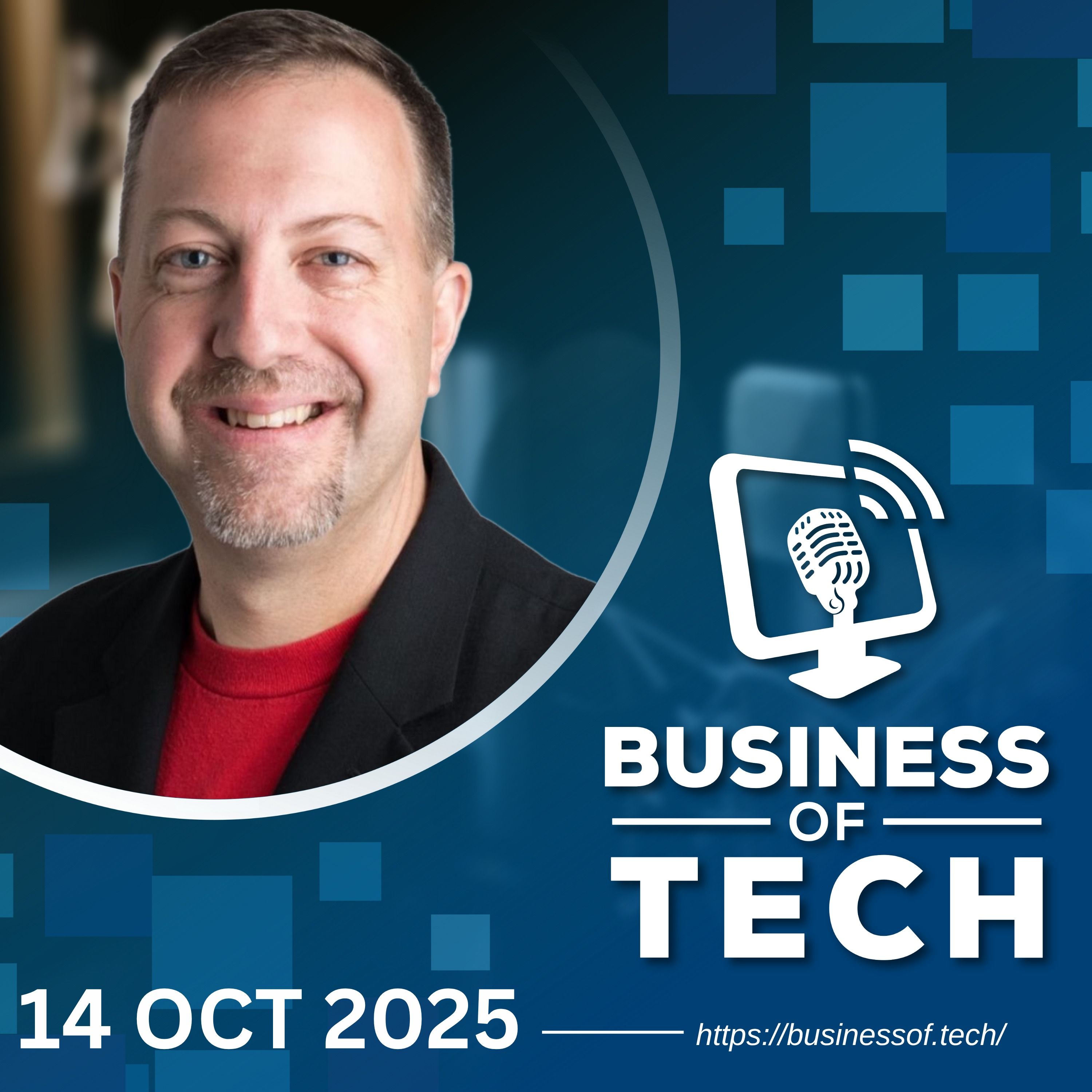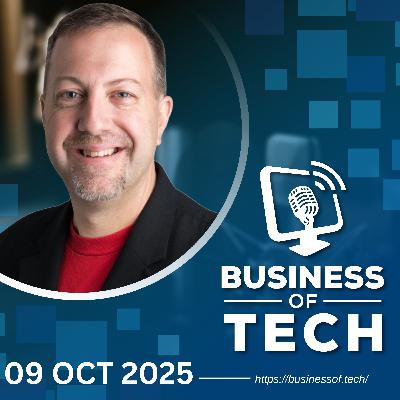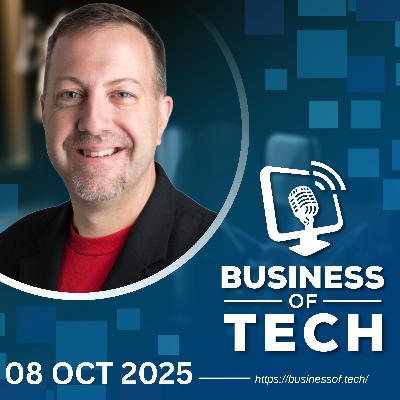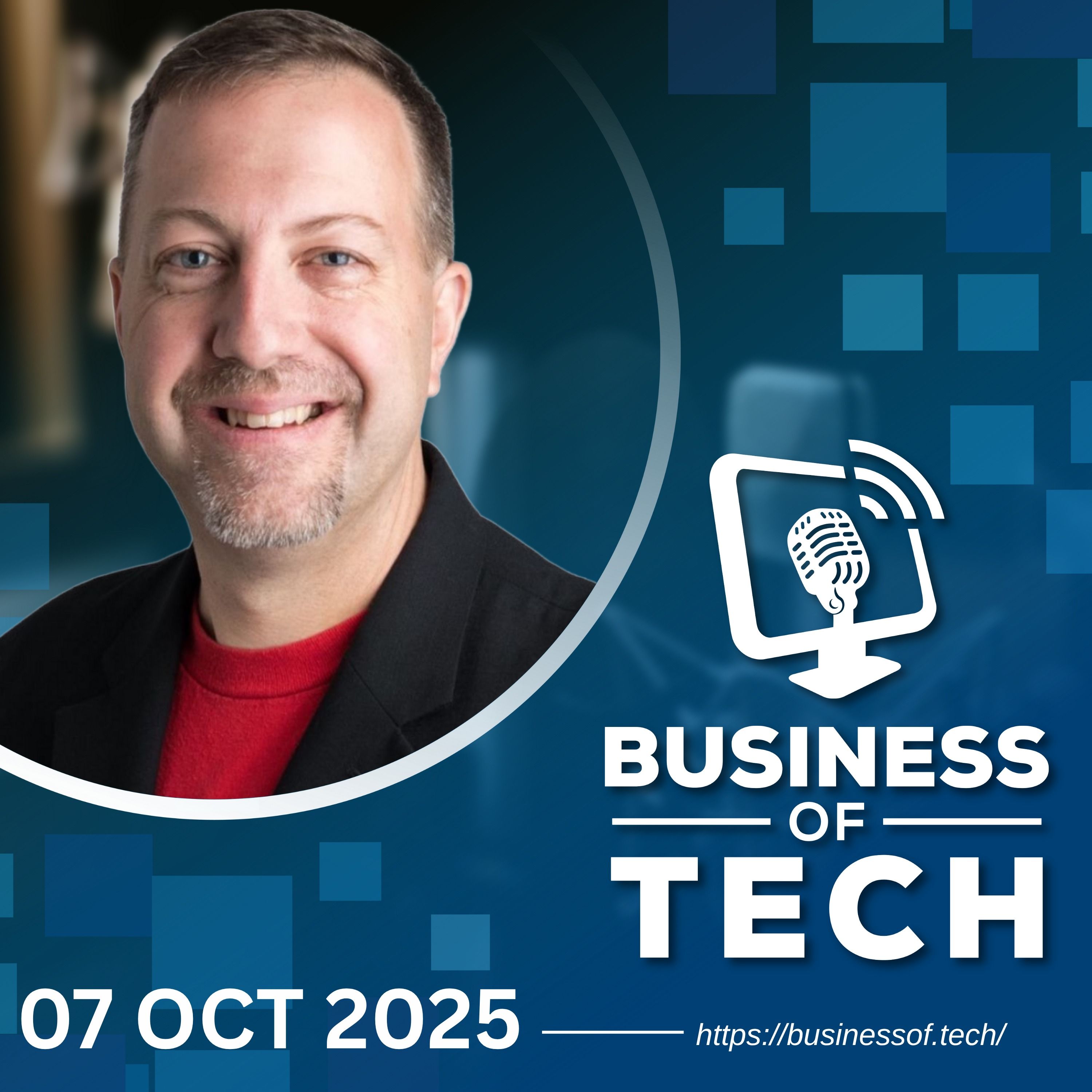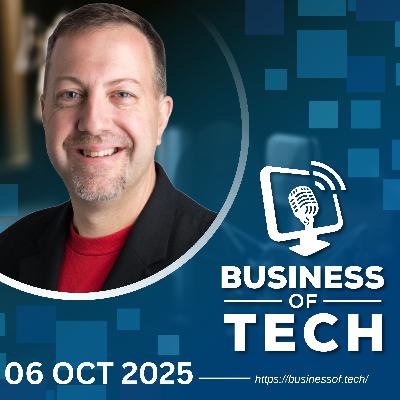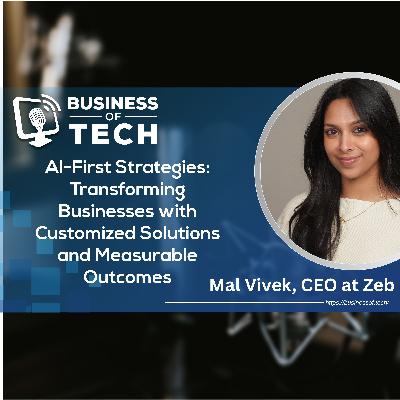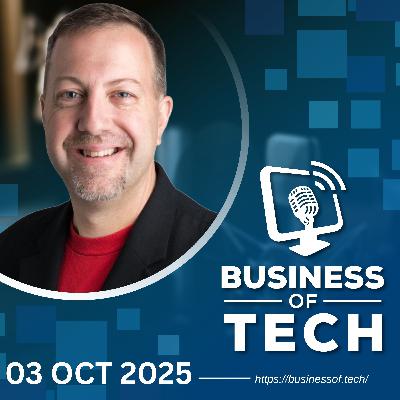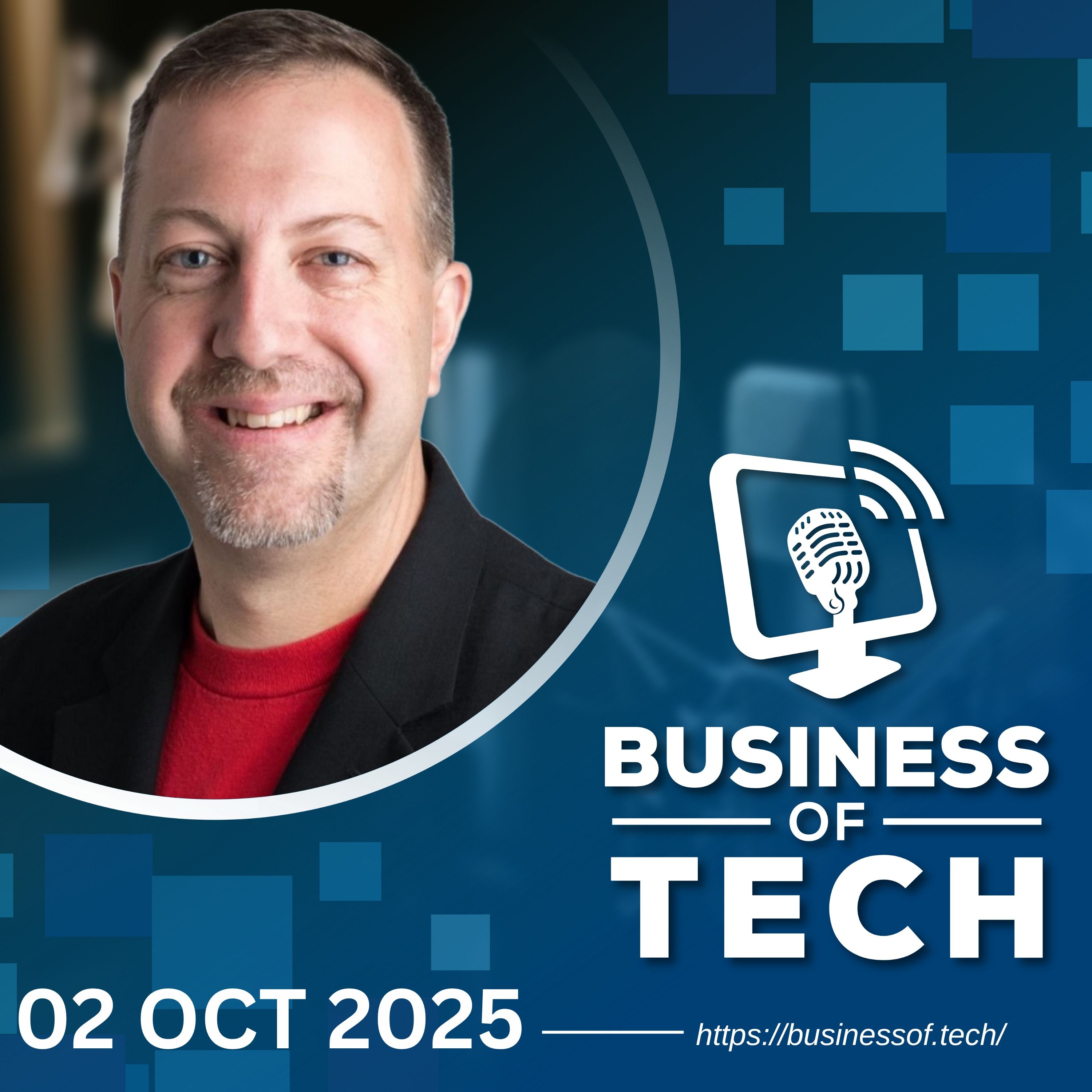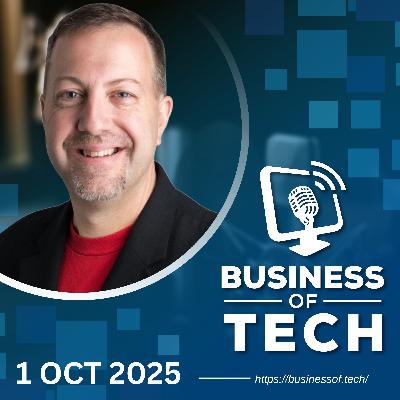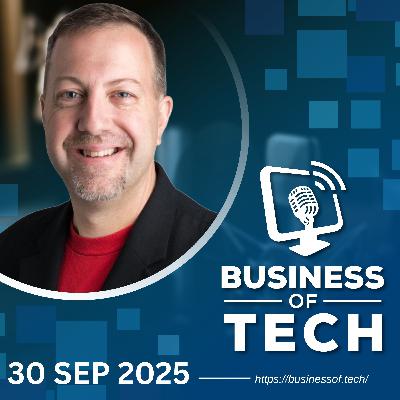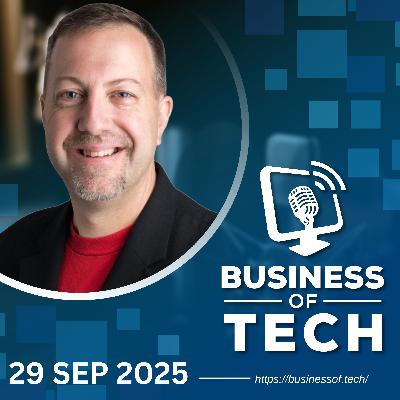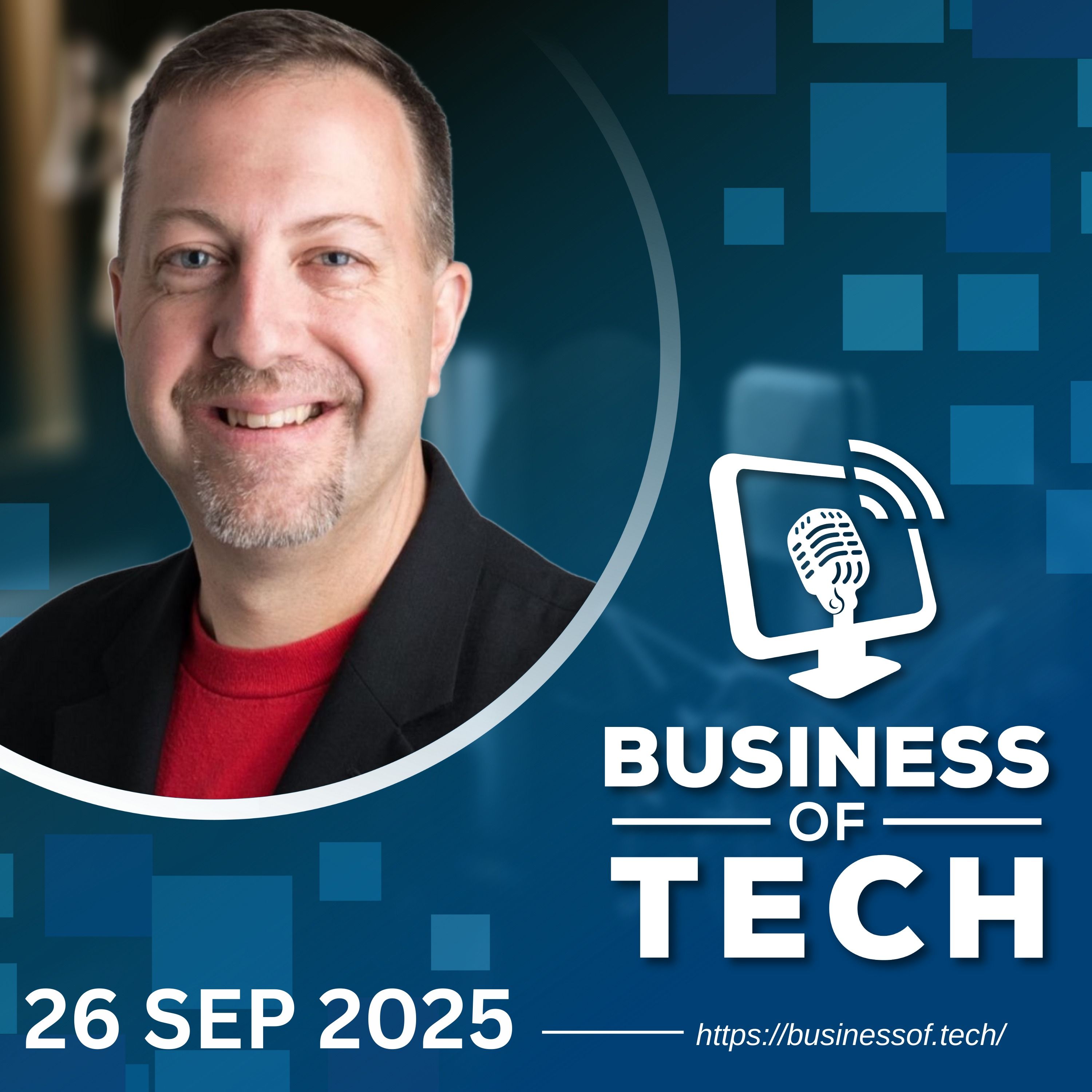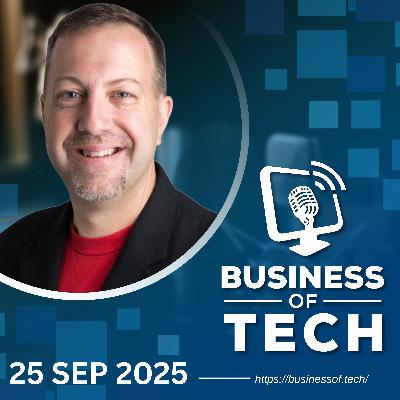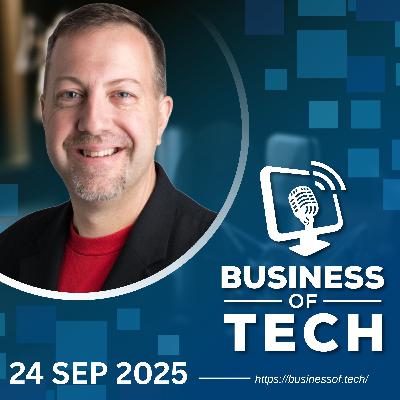Discover Business of Tech: Daily 10-Minute IT Services Insights
Business of Tech: Daily 10-Minute IT Services Insights

Business of Tech: Daily 10-Minute IT Services Insights
Author: Big Pond Podcasts
Subscribed: 134Played: 18,798Subscribe
Share
© Copyright 2019-2024 MSP Radio
Description
In 10 minutes daily, The Business of Tech delivers the latest IT services and MSP-focused news and commentary. Curated to stories that matter with commentary answering 'Why Do We Care?', channel veteran Dave Sobel brings you up to speed and provides resources to go deeper. With insights and analysis, this focused podcast focuses on the knowledge you need to be effective, profitable, and relevant.
1775 Episodes
Reverse
AI is revolutionizing IT service management, significantly enhancing productivity and operational efficiency. A recent report indicates that AI has reduced ticket resolution times by an impressive 76%, allowing IT teams to focus on more complex issues. However, the rapid adoption of generative AI, particularly in high-stakes areas like mergers and acquisitions, raises serious concerns about data security, with a significant percentage of businesses expressing worries over data quality and ethical considerations. The prevalence of unapproved AI tools among employees further complicates governance, as many are using these tools without oversight, highlighting the need for managed AI governance.California has taken a pioneering step in regulating AI by passing a landmark bill that mandates safety protocols for chatbot operators. This legislation aims to protect vulnerable users, particularly children, by requiring age verification and safety measures related to suicidal thoughts. The law, which will take effect in January 2026, reflects a growing trend toward AI regulation, emphasizing the importance of safety in technology. Meanwhile, the Federal Communications Commission is considering changes that could allow internet service providers to hide fees again, which could impact transparency for consumers.The Cybersecurity and Infrastructure Security Agency (CISA) is facing challenges as layoffs affect key divisions responsible for national security and infrastructure. These layoffs come at a time when the private sector is increasingly responsible for cybersecurity, especially amid rising AI-driven threats. The reduction in federal coordination raises concerns about the ability to effectively manage these threats, placing more pressure on managed service providers (MSPs) to ensure security and compliance for their clients.Microsoft has announced the end of support for Windows 10, prompting a critical need for MSPs to reassess endpoint security and upgrade strategies. With a significant portion of users still on Windows 10, the lack of ongoing updates poses a risk for vulnerabilities. This transition presents an opportunity for MSPs to not only push for upgrades but also to enhance security policies and prepare clients for future technological advancements, including AI integration. The evolving landscape of technology and regulation underscores the necessity for MSPs to adapt and provide comprehensive governance and security solutions. Four things to know today00:00 AI Is Working — and Breaking Rules: Efficiency Soars, But Governance Falls Behind 04:10 AI Regulation Splinters: California Targets Chatbots, FCC Eyes Fee Rollbacks, and CISA Cuts Staff07:52 The AI Assistant Race Escalates — Copilot, Slackbot, and Salesforce All Target Your Inbox and Workflow11:12 Windows 10 Support Ends — Microsoft’s Upgrade Glitch, Paid Extensions, and Opportunity for MSPsThis is the Business of Tech. Supported by: https://saasalerts.com/mspradio/
💼 All Our SponsorsSupport the vendors who support the show:👉 https://businessof.tech/sponsors/ 🚀 Join Business of Tech PlusGet exclusive access to investigative reports, vendor analysis, leadership briefings, and more.👉 https://businessof.tech/plus 🎧 Subscribe to the Business of TechWant the show on your favorite podcast app or prefer the written versions of each story?📲 https://www.businessof.tech/subscribe 📰 Story Links & SourcesLooking for the links from today’s stories?Every episode script — with full source links — is posted at:🌐 https://www.businessof.tech 🎙 Want to Be a Guest?Pitch your story or appear on Business of Tech: Daily 10-Minute IT Services Insights:💬 https://www.podmatch.com/hostdetailpreview/businessoftech 🔗 Follow Business of Tech LinkedIn: https://www.linkedin.com/company/28908079YouTube: https://youtube.com/mspradioBluesky: https://bsky.app/profile/businessof.techInstagram: https://www.instagram.com/mspradioTikTok: https://www.tiktok.com/@businessoftechFacebook: https://www.facebook.com/mspradionews Hosted by Simplecast, an AdsWizz company. See pcm.adswizz.com for information about our collection and use of personal data for advertising.
The Business of Tech Lounge features a discussion on the evolving landscape of email security, focusing on the modern threats that organizations face today. With email remaining the primary entry point for hackers, the conversation highlights how threats have shifted from simple spam to sophisticated attacks involving AI impersonation and social engineering. Experts Cody Elkley from MailProtector and Mauro Sretari from CIO Landing delve into the specifics of these threats, emphasizing the need for Managed Service Providers (MSPs) to adapt their strategies to stay ahead of potential risks.Cody explains that the nature of email threats has changed significantly over the past five years, moving from volume-based spam to targeted attacks aimed at specific individuals within organizations. Mauro adds that AI is now being leveraged by threat actors to create highly personalized phishing attempts, which can bypass traditional security measures. The discussion underscores the importance of a multi-layered security approach, where MSPs must implement robust email security protocols to protect their clients effectively.The experts also discuss the technical aspects of modern email security architecture, contrasting legacy systems with newer API-driven solutions. Cody highlights the advantages of using APIs, which allow for deeper analysis of email content and better detection of threats before they reach users. Mauro emphasizes the need for MSPs to evaluate vendors based on their integration capabilities and the usability of their security tools, ensuring that they can provide effective protection without overwhelming their clients.As the conversation wraps up, both Cody and Mauro predict that the future will see an increase in AI-assisted phishing and deepfake impersonation attacks. They stress the importance of ongoing communication between vendors and MSPs to share insights and updates on emerging threats. The episode concludes with a call for MSPs to remain vigilant and proactive in their email security strategies, adapting to the rapidly changing threat landscape to safeguard their clients' information.
💼 All Our SponsorsSupport the vendors who support the show:👉 https://businessof.tech/sponsors/ 🚀 Join Business of Tech PlusGet exclusive access to investigative reports, vendor analysis, leadership briefings, and more.👉 https://businessof.tech/plus 🎧 Subscribe to the Business of TechWant the show on your favorite podcast app or prefer the written versions of each story?📲 https://www.businessof.tech/subscribe 📰 Story Links & SourcesLooking for the links from today’s stories?Every episode script — with full source links — is posted at:🌐 https://www.businessof.tech 🎙 Want to Be a Guest?Pitch your story or appear on Business of Tech: Daily 10-Minute IT Services Insights:💬 https://www.podmatch.com/hostdetailpreview/businessoftech 🔗 Follow Business of Tech LinkedIn: https://www.linkedin.com/company/28908079YouTube: https://youtube.com/mspradioBluesky: https://bsky.app/profile/businessof.techInstagram: https://www.instagram.com/mspradioTikTok: https://www.tiktok.com/@businessoftechFacebook: https://www.facebook.com/mspradionews Hosted by Simplecast, an AdsWizz company. See pcm.adswizz.com for information about our collection and use of personal data for advertising.
AI's increasing demand for memory and storage is leading to a significant pricing crisis in the hardware market, with projections indicating that this situation could persist for the next decade. Analysts and manufacturers are warning of impending shortages of NAND and DRAM, essential components for solid-state drives and memory. The price of NAND Flash has already surged by over 100% in just six months, and DDR4 memory products are expected to rise by up to 43% in the third quarter of 2025. This crisis is largely driven by major AI projects, such as OpenAI's Stargate initiative, which could consume a staggering 40% of global DRAM output.Despite broader economic challenges, the tech sector is experiencing a rebound in hiring, particularly in Silicon Valley, where AI companies are driving a resurgence in the office market. Job postings for software developers, cybersecurity engineers, and AI engineers have seen notable increases, even as the private sector overall lost jobs. The demand for tech talent remains high, with international tech workers still viewing the U.S. as an attractive destination. This shift contradicts earlier predictions that AI would lead to widespread job losses, instead highlighting a transformation in workforce dynamics.The podcast also discusses a significant shift in the perception of market development funds (MDF) among channel partners. Traditional MDF programs are becoming obsolete, with partners now prioritizing outcome-based funds and training that enhance capabilities and align with customer success. This change reflects a broader trend in vendor-partner relationships, where partners seek strategic alliances focused on measurable outcomes rather than outdated financial support for marketing activities. The evolving landscape emphasizes the need for specialization and collaboration to thrive in the current market.Finally, the episode touches on the concept of "inshittification," particularly in relation to Amazon's declining customer-centric approach as it prioritizes profits over user experience. This trend raises concerns about the future of online commerce and the trustworthiness of platforms. Additionally, the discussion includes insights on employee satisfaction post-IPO, the evolution of AI technology at Notion, and the challenges faced by OpenAI as it navigates financial losses. These topics prompt critical reflections on vendor relationships, the impact of public offerings on innovation, and the readiness of clients for advanced AI systems. Four things to know today00:00 AI Boom Sparks Global Memory Shortage, Driving Decade-Long Hardware Price Surge04:23 AI Fuels Tech Hiring Surge as U.S. Job Market Splits in Two07:14 MDF Is Dead: Partners Demand Outcome-Based Funding and Strategic Enablement10:10 Amazon’s Enshittification, IPO Fallout, and OpenAI’s Struggle — Strategy Lessons for IT Providers This is the Business of Tech. Supported by: https://getflexpoint.com/msp-radio/https://scalepad.com/dave/ Webinar: https://bit.ly/msprmail
💼 All Our SponsorsSupport the vendors who support the show:👉 https://businessof.tech/sponsors/ 🚀 Join Business of Tech PlusGet exclusive access to investigative reports, vendor analysis, leadership briefings, and more.👉 https://businessof.tech/plus 🎧 Subscribe to the Business of TechWant the show on your favorite podcast app or prefer the written versions of each story?📲 https://www.businessof.tech/subscribe 📰 Story Links & SourcesLooking for the links from today’s stories?Every episode script — with full source links — is posted at:🌐 https://www.businessof.tech 🎙 Want to Be a Guest?Pitch your story or appear on Business of Tech: Daily 10-Minute IT Services Insights:💬 https://www.podmatch.com/hostdetailpreview/businessoftech 🔗 Follow Business of Tech LinkedIn: https://www.linkedin.com/company/28908079YouTube: https://youtube.com/mspradioBluesky: https://bsky.app/profile/businessof.techInstagram: https://www.instagram.com/mspradioTikTok: https://www.tiktok.com/@businessoftechFacebook: https://www.facebook.com/mspradionews Hosted by Simplecast, an AdsWizz company. See pcm.adswizz.com for information about our collection and use of personal data for advertising.
AI-powered cyberattacks are rapidly evolving, prompting a significant shift in cybersecurity strategies. According to a recent Gartner report, IT leaders are expected to allocate over half of their cybersecurity budgets to preemptive defense measures by 2030. This change is driven by the inadequacy of traditional detection and response tools in the face of sophisticated cyber threats, particularly those enhanced by artificial intelligence. Experts warn that while preemptive measures can mitigate risks, organizations may encounter challenges in integrating these new systems and overcoming cultural inertia.Datadog's 2025 State of Cloud Security Report highlights a growing trend among organizations adopting data perimeters to combat credential theft, with 40% of organizations implementing this advanced security practice. Additionally, 86% of organizations are utilizing multi-account setups within AWS, which allows for better enforcement of security protocols. Meanwhile, OpenAI's report reveals that cybercriminals are increasingly leveraging AI for malicious activities, including phishing and surveillance, showcasing the urgent need for enhanced cybersecurity measures.In response to market pressures, Synology has reversed its policy on drive restrictions for its network-attached storage models, allowing the use of non-validated third-party drives. This decision comes after user feedback indicated dissatisfaction with the previous requirement for proprietary drives, which were often more expensive. For managed service providers (MSPs), this change offers greater flexibility and cost-effectiveness, making Synology's products more appealing once again.Pax8 has launched the Pax8 Agent Store, a platform designed to help MSPs adopt and offer AI-driven tools to small and medium-sized businesses. This marketplace aims to facilitate the integration and monetization of intelligent automation solutions, with early access set for December 2025. Additionally, SolarWinds has introduced an AI agent to enhance operational resilience for IT teams, while Barracuda Networks has launched Barracuda Research, a centralized resource for threat intelligence. Both initiatives aim to empower organizations in managing cybersecurity threats more effectively. Four things to know today00:00 Gartner, OpenAI, Datadog, and DHS Paint a Stark Cyber Future: AI Attacks Surge, Budgets Shift, and Defenses Fracture06:01 New Pax8 Platform Targets Repeatable AI Services, Sets Early Access for December08:03 Synology Reverses Course on Pricey Drives — Because You Stopped Buying09:53 SolarWinds and Barracuda Push AI to Ease IT Burdens—But Can They Deliver Real Value? This is the Business of Tech. Supported by: Comet, Scalepad Webinar: https://bit.ly/msprmail
💼 All Our SponsorsSupport the vendors who support the show:👉 https://businessof.tech/sponsors/ 🚀 Join Business of Tech PlusGet exclusive access to investigative reports, vendor analysis, leadership briefings, and more.👉 https://businessof.tech/plus 🎧 Subscribe to the Business of TechWant the show on your favorite podcast app or prefer the written versions of each story?📲 https://www.businessof.tech/subscribe 📰 Story Links & SourcesLooking for the links from today’s stories?Every episode script — with full source links — is posted at:🌐 https://www.businessof.tech 🎙 Want to Be a Guest?Pitch your story or appear on Business of Tech: Daily 10-Minute IT Services Insights:💬 https://www.podmatch.com/hostdetailpreview/businessoftech 🔗 Follow Business of Tech LinkedIn: https://www.linkedin.com/company/28908079YouTube: https://youtube.com/mspradioBluesky: https://bsky.app/profile/businessof.techInstagram: https://www.instagram.com/mspradioTikTok: https://www.tiktok.com/@businessoftechFacebook: https://www.facebook.com/mspradionews Hosted by Simplecast, an AdsWizz company. See pcm.adswizz.com for information about our collection and use of personal data for advertising.
Kaseya made headlines at DattoCon by announcing its shift to becoming an “AI-first” company, highlighted by its acquisition of INKY, a generative AI email security provider. Alongside this, the company unveiled new Datto products and teased its upcoming Cyber Resiliency Platform for 2026. While Kaseya’s vision of unified, intelligent automation sounds ambitious, many managed service providers (MSPs) remain skeptical, wanting to see real product integration rather than marketing promises.AI’s impact on the workforce also dominated discussion, with reports showing that one in seven U.S. jobs faces automation risk. However, experts emphasize that AI isn’t eliminating jobs—it’s transforming them. The real challenge for businesses lies in broken workflows and poor operational readiness, not the technology itself. For MSPs, this creates a new opportunity to help organizations document processes, integrate AI effectively, and deliver measurable ROI.Meanwhile, OpenAI’s trillion-dollar compute deals with major tech firms reveal the escalating financial pressure behind the AI race. Despite massive commitments with Nvidia, AMD, and Oracle, analysts question the sustainability of such spending as compute costs surge. This “AI bubble” highlights that power and price, not innovation, may soon be the industry’s greatest constraints, pushing businesses toward efficiency and smarter workloads.Finally, companies like Snowflake, IBM, Otter.ai, and Google are leading the next evolution of AI—turning it into infrastructure. From data management and cost-efficient models to meeting automation and browser-based AI agents, these developments mark the shift from experimentation to real-world integration. The emerging “intelligence layer” means that AI will soon underpin how services, systems, and workflows connect, defining the next frontier for MSPs and tech providers alike. Four things to know today 00:00 At DattoCon, Kaseya Sells an AI Future — But MSPs Want Proof, Not Promises04:19 AI Isn’t Taking Jobs — It’s Exposing Broken Workflows and Creating a New Service Market06:41 AI’s Real Risk: Not Job Loss, But Business Disorganization and Soaring Compute Costs08:42 The Intelligence Layer Emerges: Snowflake, IBM, Otter, and Google Show How AI Becomes Infrastructure This is the Business of Tech. Supported by: https://scalepad.com/dave/https://cometbackup.com/?utm_source=mspradio&utm_medium=podcast&utm_campaign=sponsorship
💼 All Our SponsorsSupport the vendors who support the show:👉 https://businessof.tech/sponsors/ 🚀 Join Business of Tech PlusGet exclusive access to investigative reports, vendor analysis, leadership briefings, and more.👉 https://businessof.tech/plus 🎧 Subscribe to the Business of TechWant the show on your favorite podcast app or prefer the written versions of each story?📲 https://www.businessof.tech/subscribe 📰 Story Links & SourcesLooking for the links from today’s stories?Every episode script — with full source links — is posted at:🌐 https://www.businessof.tech 🎙 Want to Be a Guest?Pitch your story or appear on Business of Tech: Daily 10-Minute IT Services Insights:💬 https://www.podmatch.com/hostdetailpreview/businessoftech 🔗 Follow Business of Tech LinkedIn: https://www.linkedin.com/company/28908079YouTube: https://youtube.com/mspradioBluesky: https://bsky.app/profile/businessof.techInstagram: https://www.instagram.com/mspradioTikTok: https://www.tiktok.com/@businessoftechFacebook: https://www.facebook.com/mspradionews Hosted by Simplecast, an AdsWizz company. See pcm.adswizz.com for information about our collection and use of personal data for advertising.
OpenAI has made significant strides in the AI landscape with a series of announcements that position it as a leading platform in the industry. The introduction of new models, including the GPT-5 Pro and Sora 2, alongside app integrations like Slack and a new Apps SDK, marks a pivotal moment for the company. These developments aim to enhance user interaction and streamline workflows, allowing users to perform tasks directly within the ChatGPT interface. The partnership with Advanced Micro Devices (AMD) for a multi-billion dollar chip deal further solidifies OpenAI's commitment to expanding its computing capabilities, crucial for the advancement of its AI technologies.In a contrasting scenario, Deloitte has faced scrutiny after delivering a flawed report to the Australian government, which included errors attributed to the use of AI. Despite this setback, Deloitte is moving forward with a significant partnership with Anthropic to deploy their AI chatbot, Claude, across its workforce. This juxtaposition highlights the challenges and risks associated with AI integration in business operations, emphasizing the need for careful governance and oversight. The incident serves as a cautionary tale about the potential pitfalls of relying too heavily on AI without proper verification.The podcast also discusses the broader implications of AI adoption in enterprises, revealing that a majority of AI projects are failing due to governance gaps and a lack of trust in the technology. A survey by Gartner indicates that many IT leaders are concerned about regulatory compliance, with only a small percentage feeling confident in their organizations' ability to manage AI tools effectively. This situation underscores the importance of establishing robust governance frameworks to ensure that AI implementations are both effective and trustworthy.As the AI landscape continues to evolve, the podcast suggests that service providers should pivot towards building governance frameworks and risk management strategies rather than simply promoting AI hype. The focus should shift to creating value through responsible AI use, ensuring that clients can trust the technology they are implementing. This new approach positions governance as a critical service line, essential for navigating the complexities of AI adoption and maintaining client trust in an increasingly automated world. Three things to know today 00:00 OpenAI Builds the Windows of AI: New Models, App Store, SDKs, and a Chip Deal Signal Platform Takeover06:50 Deloitte’s AI Paradox — A Costly Error in Australia, Followed by Its Biggest AI Expansion Yet09:38 AI’s Next Frontier Isn’t Innovation — It’s Accountability, and That’s Where MSPs Win This is the Business of Tech. Supported by: https://mailprotector.com/
💼 All Our SponsorsSupport the vendors who support the show:👉 https://businessof.tech/sponsors/ 🚀 Join Business of Tech PlusGet exclusive access to investigative reports, vendor analysis, leadership briefings, and more.👉 https://businessof.tech/plus 🎧 Subscribe to the Business of TechWant the show on your favorite podcast app or prefer the written versions of each story?📲 https://www.businessof.tech/subscribe 📰 Story Links & SourcesLooking for the links from today’s stories?Every episode script — with full source links — is posted at:🌐 https://www.businessof.tech 🎙 Want to Be a Guest?Pitch your story or appear on Business of Tech: Daily 10-Minute IT Services Insights:💬 https://www.podmatch.com/hostdetailpreview/businessoftech 🔗 Follow Business of Tech LinkedIn: https://www.linkedin.com/company/28908079YouTube: https://youtube.com/mspradioBluesky: https://bsky.app/profile/businessof.techInstagram: https://www.instagram.com/mspradioTikTok: https://www.tiktok.com/@businessoftechFacebook: https://www.facebook.com/mspradionews Hosted by Simplecast, an AdsWizz company. See pcm.adswizz.com for information about our collection and use of personal data for advertising.
Enterprises are significantly increasing their investments in AI governance as the risks associated with artificial intelligence become more apparent. A recent report indicates that 98% of organizations plan to boost their governance budgets in the coming financial year, with an average expected increase of 24%. This shift highlights the realization that managing AI is not a plug-and-play solution; organizations must establish multiple lines of defense to handle risks effectively. As AI technologies evolve, refining governance will be an ongoing process, especially as companies face incidents that could lead to substantial financial losses.Public cloud spending is projected to increase dramatically, primarily driven by generative AI workloads. A survey reveals that nearly half of IT leaders expect more than 30% of their cloud budgets to be allocated to generative AI in the coming years. This rapid adoption of generative AI applications necessitates improved cloud cost management strategies, as enterprises brace for higher infrastructure costs. Analysts warn that the financial models supporting this AI boom, particularly for companies like Oracle, which may need to borrow significantly to meet obligations, raise concerns about sustainability.Despite fears of job losses due to AI, a study from Yale University indicates that generative AI has not yet significantly disrupted the job market. The research shows only a slight change in the occupational mix since the launch of ChatGPT, with hiring in the tech sector remaining steady. A significant portion of tech employers plan to hire, particularly for roles related to AI, indicating that the demand for skills like Python and project management is driving this trend. The study suggests that while generative AI has transformative potential, it is too early to assess its long-term effects on employment.In a notable industry development, Huntress has partnered with SureWeb to expand its cybersecurity solutions, marking its first distribution deal. This collaboration allows Huntress's products to be available in the SureWeb marketplace, enhancing security offerings for managed service providers across various regions. The partnership emphasizes the importance of relationships over transactions, contrasting with larger marketplaces. This move reflects a growing trend where vendors prioritize community-focused partnerships, providing opportunities for service providers to access quality cybersecurity solutions while navigating the evolving landscape of AI and technology.Four things to know today 00:00 AI’s Hidden Cost: Governance Budgets Up, Cloud Bills Soar, and Debt Piles High Behind the Boom05:25 Government Shutdown and Policy Turmoil, Not AI, Emerging as Real Threats to U.S. Employment10:17 Pax8’s “Managed Intelligence” Push Highlights Growing Tension Between AI Hype and MSP Readiness13:28 Huntress and Sherweb Redefine Channel Strategy with Relationship-First Distribution Model This is the Business of Tech. Supported by: https://cometbackup.com/?utm_source=mspradio&utm_medium=podcast&utm_campaign=sponsorshiphttps://www.auvik.com/ Webinar: https://bit.ly/msprmail
💼 All Our SponsorsSupport the vendors who support the show:👉 https://businessof.tech/sponsors/ 🚀 Join Business of Tech PlusGet exclusive access to investigative reports, vendor analysis, leadership briefings, and more.👉 https://businessof.tech/plus 🎧 Subscribe to the Business of TechWant the show on your favorite podcast app or prefer the written versions of each story?📲 https://www.businessof.tech/subscribe 📰 Story Links & SourcesLooking for the links from today’s stories?Every episode script — with full source links — is posted at:🌐 https://www.businessof.tech 🎙 Want to Be a Guest?Pitch your story or appear on Business of Tech: Daily 10-Minute IT Services Insights:💬 https://www.podmatch.com/hostdetailpreview/businessoftech 🔗 Follow Business of Tech LinkedIn: https://www.linkedin.com/company/28908079YouTube: https://youtube.com/mspradioBluesky: https://bsky.app/profile/businessof.techInstagram: https://www.instagram.com/mspradioTikTok: https://www.tiktok.com/@businessoftechFacebook: https://www.facebook.com/mspradionews Hosted by Simplecast, an AdsWizz company. See pcm.adswizz.com for information about our collection and use of personal data for advertising.
Full transcript and links to extended interviews is at https://businessof.tech/podcast/datto-sues-slide-2025/What happens when a founder returns to disrupt the company he built, and that company sues him for stealing its secrets? This is the central conflict in the case of Datto v. Slide, a legal battle unfolding in Delaware. Datto, now owned by Kaseya, accuses Slide, founded by former Datto CEO Austin McCord, of misappropriating proprietary technology related to its Hardware Independent Restore (HIR) system. Slide, on the other hand, asserts that it developed its technology independently and that Datto's lawsuit is merely a distraction from the reality that better products will prevail in the market. The lawsuit includes multiple allegations, such as trade secret misappropriation and unfair competition. Datto claims that Slide's technology closely resembles its own HIR, which allows for near-instant recovery of systems across different virtual environments. The complaint details how Datto's HIR operates and the proprietary elements it encompasses, arguing that Slide's founders had access to these trade secrets and used them to expedite their competing platform. Slide counters these claims by emphasizing that its product was built from the ground up, utilizing modern tools and practices that do not infringe on Datto's intellectual property. To provide further context, the podcast features interviews with Slide's founders, who discuss the safeguards they implemented during development to ensure compliance with legal obligations and to avoid using any confidential information from Datto. They assert that their technology is fundamentally different and that their marketing strategies, including a dramatic demonstration involving the destruction of Datto hardware, were intended as light-hearted competition rather than disparagement. The conversation highlights the importance of transparency and trust for Managed Service Providers (MSPs) considering which platform to support. The episode also delves into the broader implications of the case, particularly how litigation can serve as a competitive strategy in a consolidating market. With Kaseya reportedly carrying significant debt, the lawsuit may reflect a defensive posture rather than a commitment to innovation. For MSPs, the ongoing legal battle raises questions about vendor reliability and the potential distractions that litigation can create. Ultimately, the podcast suggests that while the case may settle, the reputational costs for Kaseya could be substantial, impacting its image as a channel-friendly company. 00:00 Intro: Founder vs Incumbent01:45 Case Summary: Datto v. Slide Explained02:22 Inside HIR: The Alleged Trade Secret04:47 Slide’s Defense06:05 Timeline and Next Steps08:36 Interview: Slide Founders Respond14:04 Expert Analysis: Bob Zeidman20:10 Expert Analysis: Prof. Camilla Hrdy24:10 Market Context: Kaseya’s Debt & Strategy26:24 Lessons for MSPs28:33 Closing Take: What This Means for the Channel
💼 All Our SponsorsSupport the vendors who support the show:👉 https://businessof.tech/sponsors/ 🚀 Join Business of Tech PlusGet exclusive access to investigative reports, vendor analysis, leadership briefings, and more.👉 https://businessof.tech/plus 🎧 Subscribe to the Business of TechWant the show on your favorite podcast app or prefer the written versions of each story?📲 https://www.businessof.tech/subscribe 📰 Story Links & SourcesLooking for the links from today’s stories?Every episode script — with full source links — is posted at:🌐 https://www.businessof.tech 🎙 Want to Be a Guest?Pitch your story or appear on Business of Tech: Daily 10-Minute IT Services Insights:💬 https://www.podmatch.com/hostdetailpreview/businessoftech 🔗 Follow Business of Tech LinkedIn: https://www.linkedin.com/company/28908079YouTube: https://youtube.com/mspradioBluesky: https://bsky.app/profile/businessof.techInstagram: https://www.instagram.com/mspradioTikTok: https://www.tiktok.com/@businessoftechFacebook: https://www.facebook.com/mspradionews Hosted by Simplecast, an AdsWizz company. See pcm.adswizz.com for information about our collection and use of personal data for advertising.
Mal Vivek, founder and CEO of Zeb, discusses the rapid growth of her firm, which has become a leader in digital and AI transformation. Zeb has established itself as one of the fastest-growing AWS Premier Tier and Databricks partners, primarily by addressing the challenges small and medium businesses face in implementing AI solutions. Vivek emphasizes the importance of understanding each client's unique business model and tailoring AI solutions to meet their specific needs, rather than offering a one-size-fits-all approach.Vivek highlights the significant shift in lead generation strategies among their clients, who are increasingly utilizing AI to create more targeted and high-quality leads. This change reflects a broader trend where businesses are moving away from traditional lead lists and instead developing custom AI systems that align with their ideal customer profiles. Additionally, she notes the importance of training and upskilling employees through AI, enabling them to access vast amounts of knowledge quickly and efficiently.The conversation also touches on the concept of an "AI-first strategy," which varies in definition across different organizations. For Zeb, this strategy involves identifying repetitive tasks that can be enhanced through AI while ensuring that the human touch remains integral to the customer experience. Vivek stresses the need for restraint in digital transformation, arguing that not every process should be automated, especially when personal interaction is a key component of a business's success.Finally, Vivek discusses the evolving business models driven by AI, including a shift towards value-based pricing. She explains how Zeb structures its pricing around measurable outcomes and mutual agreements on success metrics, ensuring that both the firm and its clients benefit from the results achieved. This approach not only fosters accountability but also aligns the interests of Zeb with those of its customers, ultimately driving better business outcomes.
💼 All Our SponsorsSupport the vendors who support the show:👉 https://businessof.tech/sponsors/ 🚀 Join Business of Tech PlusGet exclusive access to investigative reports, vendor analysis, leadership briefings, and more.👉 https://businessof.tech/plus 🎧 Subscribe to the Business of TechWant the show on your favorite podcast app or prefer the written versions of each story?📲 https://www.businessof.tech/subscribe 📰 Story Links & SourcesLooking for the links from today’s stories?Every episode script — with full source links — is posted at:🌐 https://www.businessof.tech 🎙 Want to Be a Guest?Pitch your story or appear on Business of Tech: Daily 10-Minute IT Services Insights:💬 https://www.podmatch.com/hostdetailpreview/businessoftech 🔗 Follow Business of Tech LinkedIn: https://www.linkedin.com/company/28908079YouTube: https://youtube.com/mspradioBluesky: https://bsky.app/profile/businessof.techInstagram: https://www.instagram.com/mspradioTikTok: https://www.tiktok.com/@businessoftechFacebook: https://www.facebook.com/mspradionews Hosted by Simplecast, an AdsWizz company. See pcm.adswizz.com for information about our collection and use of personal data for advertising.
Diving into the evolving landscape of the partner ecosystem, the discussion centers around three major forces shaping the industry by 2030. First, cloud marketplaces are projected to reach $163 billion in transactions, with nearly 60% of that being partner-led. This shift signifies a redefinition of partner value in the marketplace era, moving beyond traditional procurement methods. Second, the rise of AI services is highlighted, with a projected $267 billion opportunity by 2030, growing at an impressive 35% CAGR. This transition emphasizes the importance of packaging, governance, and delivering measurable outcomes rather than merely developing AI technologies.The conversation also delves into the critical role of cybersecurity as a services multiplier, with a study indicating that for every dollar spent on the CrowdStrike Falcon platform, partners can generate over $7 in services revenue. This statistic underscores the potential for partners to leverage cybersecurity solutions to enhance their service offerings. Jay McBain, Chief Analyst at Omdia, provides insights into how these trends impact channel partners, vendors, and the future of IT services, emphasizing the need for partners to adapt to these changes. As the discussion progresses, the challenges and opportunities for partners in the AI landscape are examined. The conversation points out that while AI is becoming a feature rather than a standalone product, partners must engage with business leaders across various departments to capitalize on the growing demand for AI-driven solutions. The importance of understanding customer needs and aligning services accordingly is stressed, as partners risk being sidelined by larger system integrators and management consultants if they do not adapt.Finally, the dialogue touches on the changing economics of partnering, particularly in light of recent shifts by major vendors like Microsoft and Cisco, which are cutting back on their partner networks. This consolidation raises questions about how partners can continue to thrive in a landscape where margins are shrinking. The emphasis is placed on the necessity for partners to rethink their business models, focusing on delivering high-value services and leveraging the opportunities presented by AI and cybersecurity to ensure sustainable growth in the future.
💼 All Our SponsorsSupport the vendors who support the show:👉 https://businessof.tech/sponsors/ 🚀 Join Business of Tech PlusGet exclusive access to investigative reports, vendor analysis, leadership briefings, and more.👉 https://businessof.tech/plus 🎧 Subscribe to the Business of TechWant the show on your favorite podcast app or prefer the written versions of each story?📲 https://www.businessof.tech/subscribe 📰 Story Links & SourcesLooking for the links from today’s stories?Every episode script — with full source links — is posted at:🌐 https://www.businessof.tech 🎙 Want to Be a Guest?Pitch your story or appear on Business of Tech: Daily 10-Minute IT Services Insights:💬 https://www.podmatch.com/hostdetailpreview/businessoftech 🔗 Follow Business of Tech LinkedIn: https://www.linkedin.com/company/28908079YouTube: https://youtube.com/mspradioBluesky: https://bsky.app/profile/businessof.techInstagram: https://www.instagram.com/mspradioTikTok: https://www.tiktok.com/@businessoftechFacebook: https://www.facebook.com/mspradionews Hosted by Simplecast, an AdsWizz company. See pcm.adswizz.com for information about our collection and use of personal data for advertising.
Perplexity has made a significant move by dropping the price of its AI browser, Comet, from $200 a month to free, igniting what could be an AI browser war. This decision aims to help users navigate the overwhelming amount of low-quality online content by providing tools to summarize web pages and extract key information. A $5 monthly subscription will offer access to content from reputable media outlets, as Perplexity seeks to establish fair revenue-sharing practices with publishers. This shift comes amid ongoing legal challenges regarding content use, but the company emphasizes its commitment to high-quality sources.The recent U.S. government shutdown has led to the expiration of the Cybersecurity and Information Sharing Act of 2015, raising concerns about the future of cybersecurity collaboration. This law provided essential protections for organizations sharing cyber threat intelligence, and its absence is expected to hinder effective incident response. Experts warn that organizations may become more cautious about sharing vital information without the legal protections previously afforded, potentially increasing the risk of cyber attacks as adversaries exploit the disruption.In the tech industry, rumors are circulating about a potential investment deal between Apple and Intel, which raises questions about the future of the chip manufacturer. Apple, having previously transitioned away from Intel chips for its MacBooks, is now considering a collaboration that could see Intel manufacturing chips for Apple's data centers or producing Apple-designed chips. Meanwhile, Apple appears to be stepping back from its Vision Pro headset, which has not gained significant traction in the market, and is instead focusing on developing more affordable smart glasses.Managed service providers (MSPs) are at a critical junction as AI transitions from a luxury to a necessity. A significant portion of organizations lack policies to manage AI adoption effectively, creating both risks and opportunities for service providers. As clients demand faster resolutions and strategic insights, MSPs must modernize their services and establish governance to ensure AI delivers measurable value. The podcast emphasizes the importance of embedding AI capabilities into services rather than selling it as a standalone product, urging providers to focus on delivering outcomes that clients cannot achieve elsewhere.Four things to know today00:00 Perplexity Makes AI Browser Comet Free, Challenging Chrome, Safari, and Edge03:41 U.S. Shutdown Weakens Cyber Defense as Info-Sharing Law Expires, While NIST Races to Build Cyber AI Framework07:09 Apple Rumored to Invest in Intel Amid U.S. Chip Push, While Retreating From Vision Pro in Favor of Smart Glasses10:12 AI Is Becoming the Airline Business: Why MSPs Must Embed Capability, Not Sell Commodity This is the Business of Tech. Supported by: https://mailprotector.com/https://timezest.com/mspradio/ Webinar: https://bit.ly/msprmail
💼 All Our SponsorsSupport the vendors who support the show:👉 https://businessof.tech/sponsors/ 🚀 Join Business of Tech PlusGet exclusive access to investigative reports, vendor analysis, leadership briefings, and more.👉 https://businessof.tech/plus 🎧 Subscribe to the Business of TechWant the show on your favorite podcast app or prefer the written versions of each story?📲 https://www.businessof.tech/subscribe 📰 Story Links & SourcesLooking for the links from today’s stories?Every episode script — with full source links — is posted at:🌐 https://www.businessof.tech 🎙 Want to Be a Guest?Pitch your story or appear on Business of Tech: Daily 10-Minute IT Services Insights:💬 https://www.podmatch.com/hostdetailpreview/businessoftech 🔗 Follow Business of Tech LinkedIn: https://www.linkedin.com/company/28908079YouTube: https://youtube.com/mspradioBluesky: https://bsky.app/profile/businessof.techInstagram: https://www.instagram.com/mspradioTikTok: https://www.tiktok.com/@businessoftechFacebook: https://www.facebook.com/mspradionews Hosted by Simplecast, an AdsWizz company. See pcm.adswizz.com for information about our collection and use of personal data for advertising.
Small to medium-sized businesses (SMBs) are significantly increasing their technology budgets, focusing on strategic investments that support long-term growth. According to a study by Forrester Consulting, 88% of SMBs plan to enhance their cloud strategies and cybersecurity through increased spending on third-party services. The study also highlights a growing emphasis on improving customer experience and reducing enterprise risk, with cloud-based disaster recovery solutions and hybrid cloud strategies becoming essential. However, the integration of AI services into the economy is expected to take years, as businesses need time to learn about new AI products and train their employees.The UK government has issued a second Technical Capability Notice requiring Apple to provide access to encrypted data and messages of British users stored on its iCloud service. This directive follows a previous request that raised diplomatic tensions with the US and has led Apple to withdraw its Advanced Data Protection Service in the UK, weakening user privacy. The implications of this move are significant for SMBs that rely on iCloud, as it introduces potential security risks and highlights the need for additional encryption measures.Microsoft is facing pushback as it prepares to end free security updates for Windows 10, which is set to occur on October 14, 2025. A coalition of organizations, including repair shops and advocacy groups, is urging Microsoft to extend these updates, citing concerns that many PCs will be left insecure or unusable. With a significant portion of Windows 10 machines unable to upgrade to Windows 11, businesses are left with difficult choices regarding their operating systems, potentially leading to increased e-waste.In the realm of AI, major companies like Microsoft, Salesforce, and Stripe are launching new tools that integrate AI capabilities into their existing platforms. Microsoft has introduced Microsoft 365 Premium, which combines Office applications with AI features, while Salesforce has launched AgentForce Fibes, a tool that streamlines coding through natural language. Stripe's new instant checkout feature within ChatGPT allows users to purchase products directly from chat interfaces. These developments indicate that AI is becoming an integral part of business infrastructure, and MSPs must focus on helping clients leverage these tools effectively to drive business outcomes.Four things to know today00:00 SMBs Are Increasing Tech Budgets for Cloud, Cybersecurity, and AI, But Forrester Warns True AI Value Will Take Years to Realize04:07 UK Pressures Apple on iCloud Again, Forcing Encryption Rollback That Puts Privacy, Business Security, and Global Precedent at Risk05:39 Windows 10 Sunset Becomes a Flashpoint: Market Share, Hardware Incompatibility, and Sustainability Collide in Microsoft’s 2025 Deadline08:23 From Office to Checkout: Microsoft, Salesforce, Stripe, OpenAI, and Google Push AI Into Everyday Work and Consumer Life This is the Business of Tech. Supported by: https://scalepad.com/dave/https://mailprotector.com/ Webinar: https://bit.ly/msprmail
💼 All Our SponsorsSupport the vendors who support the show:👉 https://businessof.tech/sponsors/ 🚀 Join Business of Tech PlusGet exclusive access to investigative reports, vendor analysis, leadership briefings, and more.👉 https://businessof.tech/plus 🎧 Subscribe to the Business of TechWant the show on your favorite podcast app or prefer the written versions of each story?📲 https://www.businessof.tech/subscribe 📰 Story Links & SourcesLooking for the links from today’s stories?Every episode script — with full source links — is posted at:🌐 https://www.businessof.tech 🎙 Want to Be a Guest?Pitch your story or appear on Business of Tech: Daily 10-Minute IT Services Insights:💬 https://www.podmatch.com/hostdetailpreview/businessoftech 🔗 Follow Business of Tech LinkedIn: https://www.linkedin.com/company/28908079YouTube: https://youtube.com/mspradioBluesky: https://bsky.app/profile/businessof.techInstagram: https://www.instagram.com/mspradioTikTok: https://www.tiktok.com/@businessoftechFacebook: https://www.facebook.com/mspradionews Hosted by Simplecast, an AdsWizz company. See pcm.adswizz.com for information about our collection and use of personal data for advertising.
Artificial intelligence is reshaping the technology services landscape, with leading reports from IDC, Gartner, and new offerings from ServiceNow pointing to a future where managing AI sprawl becomes as critical as delivering AI capabilities themselves. High-performing channel partners are leaning into AI specialization, driving measurable outcomes for customers and fueling double-digit growth despite market pressures. At the same time, ServiceNow’s “AI Experience” platform aims to consolidate fragmented AI tools, offering a unified interface that can streamline operations and reduce complexity. The broader market, according to Gartner, is accelerating rapidly, with spending on generative AI projected to surpass traditional software in the coming years—meaning providers who fail to deliver outcomes risk being left behind.Yet the rise of AI isn’t all progress. Studies from Stanford, European labor groups, and cybersecurity organizations reveal a governance crisis brewing in workplaces. Workers are reporting a surge of “workslop”—AI-generated content that looks like productivity but creates no value—costing companies billions. Algorithmic management is eroding worker autonomy, while surveillance and data risks undermine trust in employers. To compound the problem, employees are increasingly feeding sensitive data into AI systems without adequate training, raising new security vulnerabilities. These trends highlight the urgent need for policies, training, and governance frameworks to ensure AI adds value instead of chaos.The disruption is also spilling into specific industries. In translation, human professionals are already being displaced as AI-driven tools gain adoption. WhatsApp’s newly built-in translation capability demonstrates how “good enough” AI can be enough for most users, sidelining human expertise except in fields requiring deep cultural or contextual understanding. The translation sector serves as an early warning sign: as AI grows more capable, other professions—including legal research, finance, and customer support—face similar pressures. The lesson for providers is to help clients identify where AI is appropriate and where human oversight remains essential.Meanwhile, major vendors are steadily encroaching into IT services, redrawing the lines of what MSPs can offer. Acronis is embedding patch management into its backup suite, Slack is introducing AI-powered ticket deflection, GoTo and Nexthink are fusing support and analytics, and IBM is shifting developer tooling to its hosted cloud. Each move chips away at traditional MSP offerings, putting pressure on providers to adapt. The opportunity lies in integration and governance—helping customers unify fragmented tools, ensure compliance, and deliver outcomes that vendors alone cannot. For MSPs, the message is clear: evolve toward higher-value services, or risk being sidelined by the very vendors you once partnered with.Four things to know today00:00 From Growth to Governance: IDC, Gartner, and ServiceNow Show Where AI Is Headed for Partners and Customers05:07 AI at Work: “Workslop,” Surveillance, and Data Leaks Signal Rising Governance Crisis08:42 From WhatsApp to Workflows: AI Translation Disruption Signals Broader Job Shifts Ahead11:33 Vendors Expand Into IT Services: Acronis, Slack, IBM, and GoTo Redraw the MSP Value Line This is the Business of Tech. Supported by: https://scalepad.com/dave/https://cometbackup.com/?utm_source=mspradio&utm_medium=podcast&utm_campaign=sponsorship Webinar: https://bit.ly/msprmail
💼 All Our SponsorsSupport the vendors who support the show:👉 https://businessof.tech/sponsors/ 🚀 Join Business of Tech PlusGet exclusive access to investigative reports, vendor analysis, leadership briefings, and more.👉 https://businessof.tech/plus 🎧 Subscribe to the Business of TechWant the show on your favorite podcast app or prefer the written versions of each story?📲 https://www.businessof.tech/subscribe 📰 Story Links & SourcesLooking for the links from today’s stories?Every episode script — with full source links — is posted at:🌐 https://www.businessof.tech 🎙 Want to Be a Guest?Pitch your story or appear on Business of Tech: Daily 10-Minute IT Services Insights:💬 https://www.podmatch.com/hostdetailpreview/businessoftech 🔗 Follow Business of Tech LinkedIn: https://www.linkedin.com/company/28908079YouTube: https://youtube.com/mspradioBluesky: https://bsky.app/profile/businessof.techInstagram: https://www.instagram.com/mspradioTikTok: https://www.tiktok.com/@businessoftechFacebook: https://www.facebook.com/mspradionews Hosted by Simplecast, an AdsWizz company. See pcm.adswizz.com for information about our collection and use of personal data for advertising.
The episode starts with the passage of California's groundbreaking AI transparency law, marking the first legislation in the United States that mandates large AI companies to disclose their safety protocols and provide whistleblower protections. This law applies to major AI labs like OpenAI, Anthropic, and Google DeepMind, requiring them to report critical safety incidents to California's Office of Emergency Services and ensure safety for communities while promoting AI growth. This regulation is a clear signal that the compliance wave surrounding AI is real, with California leading the charge in shaping the future of AI governance.The second story delves into a new cybersecurity risk in the form of the first known malicious Model Context Protocol (MCP) server discovered in the wild. A rogue npm package, "postmark-mcp," was found to be forwarding email data to an external address, exposing sensitive communications. This incident raises concerns about the security of software supply chains and highlights how highly trusted systems like MCP servers are being exploited. Service providers are urged to be vigilant, as this attack marks the emergence of a new vulnerability within increasingly complex software environments.Moving to Microsoft, the company is revamping its Marketplace to introduce stricter partner rules and enhanced discoverability for partner solutions. Microsoft’s new initiative, Intune for MSPs, aims to address the needs of managed service providers who have long struggled with multi-tenancy management. Additionally, the company’s new "Agent Mode" in Excel and Word promises to streamline productivity by automating tasks but has raised concerns over its accuracy. Despite the potential, Microsoft’s tightening ecosystem requires careful navigation for both customers and partners, with compliance and risk management being central to successful engagement.Finally, Broadcom’s decision to end support for VMware vSphere 7 has left customers with difficult decisions. As part of Broadcom’s transition to a subscription-based model, customers face either costly upgrades, cloud migrations, or reliance on third-party support. Gartner predicts that a significant number of VMware customers will migrate to the cloud in the coming years, and this shift presents a valuable opportunity for service providers to act as trusted advisors in guiding clients through the transition. For those who can manage the complexity of this migration, there’s a once-in-a-generation opportunity to capture long-term customer loyalty. Three things to know today00:00 California Enacts Nation’s First AI Transparency Law, Mandating Safety Disclosures and Whistleblower Protections05:25 First Malicious MCP Server Discovered, Exposing Email Data and Raising New Software Supply Chain Fears07:16 Microsoft’s New Playbook: Stricter Marketplace, Finally Some MSP Love, and AI That’s Right Only Half the Time11:07 VMware Customers Face Subscription Shift, Rising Cloud Moves, and Risky Alternatives as Broadcom Ends vSphere 7 This is the Business of Tech. Supported by: https://scalepad.com/dave/https://mailprotector.com/ Webinar: https://bit.ly/msprmail
💼 All Our SponsorsSupport the vendors who support the show:👉 https://businessof.tech/sponsors/ 🚀 Join Business of Tech PlusGet exclusive access to investigative reports, vendor analysis, leadership briefings, and more.👉 https://businessof.tech/plus 🎧 Subscribe to the Business of TechWant the show on your favorite podcast app or prefer the written versions of each story?📲 https://www.businessof.tech/subscribe 📰 Story Links & SourcesLooking for the links from today’s stories?Every episode script — with full source links — is posted at:🌐 https://www.businessof.tech 🎙 Want to Be a Guest?Pitch your story or appear on Business of Tech: Daily 10-Minute IT Services Insights:💬 https://www.podmatch.com/hostdetailpreview/businessoftech 🔗 Follow Business of Tech LinkedIn: https://www.linkedin.com/company/28908079YouTube: https://youtube.com/mspradioBluesky: https://bsky.app/profile/businessof.techInstagram: https://www.instagram.com/mspradioTikTok: https://www.tiktok.com/@businessoftechFacebook: https://www.facebook.com/mspradionews Hosted by Simplecast, an AdsWizz company. See pcm.adswizz.com for information about our collection and use of personal data for advertising.
The global IT services market is projected to grow significantly, reaching nearly $3 trillion by 2033, driven by the increasing adoption of cloud services, digital transformation, and a rising demand for automation and cybersecurity solutions. Proactive IT services currently dominate the market, accounting for over half of the share, particularly in heavily regulated sectors like banking, financial services, and healthcare. However, the growth of AI adoption is being hindered by spiraling legacy IT costs, which stall modernization efforts and create opportunities for IT service providers to assist organizations in bridging the gap between outdated systems and modern solutions.Investment in artificial intelligence is also on the rise, with global spending expected to reach nearly $1.5 trillion this year and surpass $2 trillion next year. The focus of this investment is broadening beyond traditional tech giants, with significant contributions from Chinese companies and new AI cloud providers. Despite concerns about job displacement due to AI, a recent survey indicates that most business leaders believe AI will enhance employee support rather than lead to significant job cuts. This highlights the importance of training and change management as organizations adapt to new technologies.Major players in the IT sector, such as Microsoft, Intuit, and OpenAI, are making significant advancements in their AI offerings. Microsoft has launched a centralized AI marketplace, integrating thousands of applications to simplify access for businesses. Intuit has improved its generative AI operating system for financial management, while OpenAI has introduced collaborative features for ChatGPT, enhancing team productivity. These developments underscore the competitive landscape as companies race to control the AI stack and provide valuable tools for enterprises.As organizations face the challenges of legacy IT systems and the need for modernization, IT service providers have a crucial role to play. They must help clients navigate the complexities of integrating new technologies while managing the human side of the transition. The emphasis on proactive services, employee training, and effective change management will be essential for businesses to thrive in an increasingly AI-driven environment. The future of IT services lies not just in technological advancements but in the ability to support clients through their transformation journeys.Three things to know today 00:00 Proactive IT Services Lead $1.5 Trillion Market, Banking and Healthcare Fuel Demand05:57 Legacy IT Costs Surging, Report Finds, Forcing Enterprises Toward Modernization07:45 From Marketplaces to Machine Learning: Tech Giants Position AI as Core Business Infrastructure This is the Business of Tech. Supported by: https://timezest.com/mspradio/https://mailprotector.com/ Webinar: https://bit.ly/msprmail
💼 All Our SponsorsSupport the vendors who support the show:👉 https://businessof.tech/sponsors/ 🚀 Join Business of Tech PlusGet exclusive access to investigative reports, vendor analysis, leadership briefings, and more.👉 https://businessof.tech/plus 🎧 Subscribe to the Business of TechWant the show on your favorite podcast app or prefer the written versions of each story?📲 https://www.businessof.tech/subscribe 📰 Story Links & SourcesLooking for the links from today’s stories?Every episode script — with full source links — is posted at:🌐 https://www.businessof.tech 🎙 Want to Be a Guest?Pitch your story or appear on Business of Tech: Daily 10-Minute IT Services Insights:💬 https://www.podmatch.com/hostdetailpreview/businessoftech 🔗 Follow Business of Tech LinkedIn: https://www.linkedin.com/company/28908079YouTube: https://youtube.com/mspradioBluesky: https://bsky.app/profile/businessof.techInstagram: https://www.instagram.com/mspradioTikTok: https://www.tiktok.com/@businessoftechFacebook: https://www.facebook.com/mspradionews Hosted by Simplecast, an AdsWizz company. See pcm.adswizz.com for information about our collection and use of personal data for advertising.
Alexander Schlager, CEO of Aiceberg.ai, discusses the intersection of artificial intelligence (AI) and cybersecurity, emphasizing the importance of securing AI-powered workflows. Aiceberg employs traditional machine learning techniques to safeguard generative AI systems, providing a deterministic and explainable approach to security. This method allows organizations to understand how their AI systems operate and ensures that they can trace and audit the decisions made by these systems, which is crucial in an era where AI incidents may lead to legal challenges.The conversation highlights the need for organizations to establish robust governance frameworks as they adopt AI technologies. Schlager points out that many businesses are still grappling with basic cybersecurity measures, which complicates their ability to implement effective AI governance. He stresses that organizations must assess their existing security postures and ensure that they are prepared for the rapid deployment of agentic AI, which allows non-technical users to create and manage AI workflows independently.Schlager provides concrete examples of how Aiceberg's technology is integrated into real-world applications, such as in the banking sector, where AI workflows may involve third-party interactions. He explains that Aiceberg monitors these interactions to classify and respond to potential security threats, ensuring that organizations can demonstrate compliance and safety in the event of an incident. This proactive approach to security is essential for maintaining trust and accountability in AI systems.Finally, the discussion touches on the broader implications of AI adoption, including the potential for improved customer experiences across various industries. Schlager notes that while AI can enhance service delivery, organizations must navigate the challenges of user expectations and the maturity of their AI implementations. By focusing on customer service and experience, companies can unlock significant value from their AI investments, but they must also prioritize security and governance to mitigate risks.
💼 All Our SponsorsSupport the vendors who support the show:👉 https://businessof.tech/sponsors/ 🚀 Join Business of Tech PlusGet exclusive access to investigative reports, vendor analysis, leadership briefings, and more.👉 https://businessof.tech/plus 🎧 Subscribe to the Business of TechWant the show on your favorite podcast app or prefer the written versions of each story?📲 https://www.businessof.tech/subscribe 📰 Story Links & SourcesLooking for the links from today’s stories?Every episode script — with full source links — is posted at:🌐 https://www.businessof.tech 🎙 Want to Be a Guest?Pitch your story or appear on Business of Tech: Daily 10-Minute IT Services Insights:💬 https://www.podmatch.com/hostdetailpreview/businessoftech 🔗 Follow Business of Tech LinkedIn: https://www.linkedin.com/company/28908079YouTube: https://youtube.com/mspradioBluesky: https://bsky.app/profile/businessof.techInstagram: https://www.instagram.com/mspradioTikTok: https://www.tiktok.com/@businessoftechFacebook: https://www.facebook.com/mspradionews Hosted by Simplecast, an AdsWizz company. See pcm.adswizz.com for information about our collection and use of personal data for advertising.
Managed service providers (MSPs) are experiencing significant growth driven by interest in artificial intelligence (AI), with 92% reporting an uptick in business. However, a concerning trend has emerged: only about half of these providers feel equipped to assist small and mid-sized businesses in adopting AI tools, a sharp decline from 90% the previous year. This growing readiness gap highlights the challenges MSPs face in meeting customer expectations as AI adoption accelerates. Experts emphasize the need for integrated security solutions to help navigate the complexities of AI.OpenAI's recent benchmarks reveal that a staggering 95% of enterprise AI projects fail, underscoring the difficulties companies encounter in justifying their AI investments. Despite advancements in AI models, their effectiveness remains inconsistent, particularly in handling complex, ongoing projects. The evaluation system introduced by OpenAI aims to bridge the gap between theoretical capabilities and real-world demands, indicating that while AI can perform tasks faster and cheaper than humans, it still struggles with contextual understanding and interaction.In the realm of digital content, Cloudflare has launched a feature allowing website owners to block Google's AI overview search product, addressing concerns from publishers about traffic losses due to AI-generated content. This move comes amid legal challenges faced by Google from publishers who argue that their content is being used without proper attribution. While Cloudflare's feature offers a potential solution, its effectiveness hinges on Google's compliance, raising questions about the future of content ownership in the age of AI.Regulatory pressures are also reshaping the landscape for major tech companies. Microsoft has been compelled to offer free extended security updates for Windows 10 in select European markets, responding to consumer advocacy for better support. Meanwhile, Apple has delayed the release of several features in Europe due to compliance challenges with the EU's Digital Markets Act. These developments highlight the increasing influence of regulation on technology services, prompting MSPs to prepare for client inquiries regarding disparities in service offerings across regions.Four things to know today00:00 92% of MSPs Report AI-Driven Growth, But Only Half Feel Ready to Support SMB Adoption02:50 Fast, Cheap, and Fragile: OpenAI Finds AI Struggles in Real Work While Cloudflare Challenges Google’s AI Overviews06:44 EU Pressure Forces Microsoft to Extend Free Windows 10 Updates as Apple Delays Features Under DMA09:39 Innovation vs. Obligation: How Debt, Automation, and AI Metrics Are Rewriting the Managed Services PlaybookThis is the Business of Tech. Supported by: https://mailprotector.com/ Webinar: https://bit.ly/msprmail
💼 All Our SponsorsSupport the vendors who support the show:👉 https://businessof.tech/sponsors/ 🚀 Join Business of Tech PlusGet exclusive access to investigative reports, vendor analysis, leadership briefings, and more.👉 https://businessof.tech/plus 🎧 Subscribe to the Business of TechWant the show on your favorite podcast app or prefer the written versions of each story?📲 https://www.businessof.tech/subscribe 📰 Story Links & SourcesLooking for the links from today’s stories?Every episode script — with full source links — is posted at:🌐 https://www.businessof.tech 🎙 Want to Be a Guest?Pitch your story or appear on Business of Tech: Daily 10-Minute IT Services Insights:💬 https://www.podmatch.com/hostdetailpreview/businessoftech 🔗 Follow Business of Tech LinkedIn: https://www.linkedin.com/company/28908079YouTube: https://youtube.com/mspradioBluesky: https://bsky.app/profile/businessof.techInstagram: https://www.instagram.com/mspradioTikTok: https://www.tiktok.com/@businessoftechFacebook: https://www.facebook.com/mspradionews Hosted by Simplecast, an AdsWizz company. See pcm.adswizz.com for information about our collection and use of personal data for advertising.
Art Kleiner, co-author of "The AI Dilemma" and Principal at Kleiner Powell International, discusses the complexities of AI governance, trust, and accountability in the context of modern technology. He emphasizes the importance of being intentional about risk when deploying AI products, particularly large language models, which can inadvertently perpetuate biases and misinformation. Kleiner shares a compelling example of a Chinese AI system that failed to generate accurate images based on user requests, illustrating the inherent biases present in AI systems. He stresses the need for organizations to be aware of the human effects and unintended consequences of AI deployment.For managed service providers (MSPs) and IT leaders, Kleiner highlights the significance of compliance and oversight in the development process of AI systems. He references the EU AI Act, which mandates a "human in the loop" approach to ensure accountability and effectiveness in AI applications. This requirement encourages organizations to conduct thorough testing and evaluation of AI systems in real-world contexts, ensuring that they meet the needs of users and mitigate potential risks. Kleiner notes that small businesses, in particular, must be vigilant about the implications of AI on their operations and customer interactions.The conversation also delves into the challenges of achieving measurable ROI from AI projects, with studies indicating that a significant percentage of these initiatives fail to deliver tangible business value. Kleiner advocates for scenario planning as a tool to navigate the uncertainties of AI implementation, encouraging organizations to explore various future scenarios and their potential impacts. By understanding the different ways AI can affect productivity, business growth, and risk management, companies can better position themselves to leverage AI effectively.Finally, Kleiner urges leaders to prepare for multiple AI futures by staying informed about emerging technologies and their implications for their businesses. He emphasizes the need for organizations to build trust with their customers by using AI responsibly and transparently. By focusing on creating value and avoiding the pitfalls of "inshittification," businesses can foster stronger relationships with their clients and enhance their overall service offerings. The discussion underscores the critical role of human insight and ethical considerations in the evolving landscape of AI technology.
💼 All Our SponsorsSupport the vendors who support the show:👉 https://businessof.tech/sponsors/ 🚀 Join Business of Tech PlusGet exclusive access to investigative reports, vendor analysis, leadership briefings, and more.👉 https://businessof.tech/plus 🎧 Subscribe to the Business of TechWant the show on your favorite podcast app or prefer the written versions of each story?📲 https://www.businessof.tech/subscribe 📰 Story Links & SourcesLooking for the links from today’s stories?Every episode script — with full source links — is posted at:🌐 https://www.businessof.tech 🎙 Want to Be a Guest?Pitch your story or appear on Business of Tech: Daily 10-Minute IT Services Insights:💬 https://www.podmatch.com/hostdetailpreview/businessoftech 🔗 Follow Business of Tech LinkedIn: https://www.linkedin.com/company/28908079YouTube: https://youtube.com/mspradioBluesky: https://bsky.app/profile/businessof.techInstagram: https://www.instagram.com/mspradioTikTok: https://www.tiktok.com/@businessoftechFacebook: https://www.facebook.com/mspradionews Hosted by Simplecast, an AdsWizz company. See pcm.adswizz.com for information about our collection and use of personal data for advertising.
Generative AI is significantly transforming technology jobs, particularly by automating repetitive tasks such as coding and data processing. A recent analysis by Indeed indicates that while many tech skills will evolve, less than 1% are likely to be fully replaced by AI. This shift is creating challenges for organizations, as employees struggle with the overwhelming number of AI tools available, leading to wasted hours and lost productivity. Companies are urged to streamline their operations by implementing unified platforms that can integrate AI effectively, reducing manual tasks and enhancing overall productivity.The issue of AI agent sprawl is highlighted, where organizations may manage numerous AI agents, resulting in chaos rather than transformation. Analysts are reportedly losing an average of 9.1 hours each week due to inefficient workflows, costing companies billions annually. Despite this, many executives mistakenly believe their teams are operating at peak productivity. The podcast emphasizes the need for organizations to measure productivity based on actual output and create operational visibility to unlock growth potential.Diversity in IT leadership is another pressing concern, as the representation of women in technology continues to decline. A recent report reveals that while the number of women in the ICT sector has increased, men still dominate management roles. The exit of thousands of women from tech roles each year is attributed to a lack of career progression and recognition, rather than personal responsibilities. This trend not only affects workplace culture but also has significant economic implications, with billions lost due to decreased productivity and recruitment challenges.Finally, Google is merging Android and Chrome OS to create a new operating system aimed at enhancing AI capabilities on personal computers. This development is expected to impact how IT manages devices, particularly in K-12 and small business markets. Providers are advised to prepare for this shift by developing training and support strategies for clients. The podcast concludes with a call to action for IT leaders to focus on practical solutions to modern challenges, including email security, while also addressing the critical need for diversity and inclusion within the tech industry.Four things to know today00:00 AI Isn’t Killing Jobs—It’s Killing Repetition. The Real Risk Is Agent Sprawl and Lost Productivity04:52 Vendors Double Down on MSP Stack: MCP Standardization, New Partnerships, and Leadership Shifts08:37 Diversity in Tech Leadership Stalls as Women Exit and DEI Programs Fade—A Capacity Crisis for Providers13:36 Google’s New Unified OS: AI Promise for Users, Support Headache for ProvidersThis is the Business of Tech. Supported by: https://cometbackup.com/?utm_source=mspradio&utm_medium=podcast&utm_campaign=sponsorshiphttps://mailprotector.com/Webinar: https://bit.ly/msprmail
💼 All Our SponsorsSupport the vendors who support the show:👉 https://businessof.tech/sponsors/ 🚀 Join Business of Tech PlusGet exclusive access to investigative reports, vendor analysis, leadership briefings, and more.👉 https://businessof.tech/plus 🎧 Subscribe to the Business of TechWant the show on your favorite podcast app or prefer the written versions of each story?📲 https://www.businessof.tech/subscribe 📰 Story Links & SourcesLooking for the links from today’s stories?Every episode script — with full source links — is posted at:🌐 https://www.businessof.tech 🎙 Want to Be a Guest?Pitch your story or appear on Business of Tech: Daily 10-Minute IT Services Insights:💬 https://www.podmatch.com/hostdetailpreview/businessoftech 🔗 Follow Business of Tech LinkedIn: https://www.linkedin.com/company/28908079YouTube: https://youtube.com/mspradioBluesky: https://bsky.app/profile/businessof.techInstagram: https://www.instagram.com/mspradioTikTok: https://www.tiktok.com/@businessoftechFacebook: https://www.facebook.com/mspradionews Hosted by Simplecast, an AdsWizz company. See pcm.adswizz.com for information about our collection and use of personal data for advertising.
The Defense Department's Cybersecurity Maturity Model Certification (CMMC) effort has uncovered that many contractors are unaware of export control violations, which could lead to significant legal and financial penalties. As the certification becomes mandatory, early assessments indicate common violations of the International Traffic in Arms Regulation and Export Administration Regulations. Contractors are urged to map controlled, unclassified information and review data controls to identify and mitigate these violations before audits occur. This highlights the critical need to integrate export compliance with cybersecurity measures.Meanwhile, Congress is experimenting with Microsoft's AI chatbot, CoPilot, as part of an initiative to incorporate artificial intelligence into legislative operations. This move has sparked concerns among critics regarding the potential risks of misinformation and privacy hazards associated with using experimental technology in governance. Additionally, Congress faces challenges in renewing a vital cyber threat information sharing program, which is set to expire soon, raising alarms about the implications for national cybersecurity efforts.On the cybersecurity front, artificial intelligence is increasingly being exploited by criminal hackers, leading to a new era of sophisticated attacks. Generative AI technologies are being used to craft convincing phishing scams and manipulate everyday tools to execute attacks without triggering security alerts. Recent incidents have demonstrated the effectiveness of these tactics, emphasizing the need for heightened vigilance and advanced security measures to protect against evolving threats.In the realm of technology, companies like Notion, Google, and Zoom are embedding powerful AI features into their platforms, fundamentally changing how users interact with these tools. Notion's new AI agent can autonomously perform tasks, while Google has integrated its Gemini AI into Chrome for enhanced usability and security. Zoom is set to introduce photorealistic AI avatars for meetings, showcasing the rapid adoption of AI in everyday applications. As these tools become the new baseline, IT service providers must adapt by focusing on governance, compliance, and security to ensure that their clients can safely navigate this evolving landscape. Four things to know today 00:00 Compliance Blind Spots, Political Delays, and AI Experiments Show Why IT Providers Must Be the Steady Hand05:02 Generative AI Fuels Phishing and Supply Chain Attacks While SonicWall and WatchGuard Struggle With Flaws09:08 Notion, Google, and Zoom Push AI Deeper Into Everyday Tools12:43 Ingram Micro Credits Xvantage for Ransomware Recovery, but MSPs Should Focus on Client Continuity This is the Business of Tech. Supported by: scalepad Webinar: https://bit.ly/msprmail
💼 All Our SponsorsSupport the vendors who support the show:👉 https://businessof.tech/sponsors/ 🚀 Join Business of Tech PlusGet exclusive access to investigative reports, vendor analysis, leadership briefings, and more.👉 https://businessof.tech/plus 🎧 Subscribe to the Business of TechWant the show on your favorite podcast app or prefer the written versions of each story?📲 https://www.businessof.tech/subscribe 📰 Story Links & SourcesLooking for the links from today’s stories?Every episode script — with full source links — is posted at:🌐 https://www.businessof.tech 🎙 Want to Be a Guest?Pitch your story or appear on Business of Tech: Daily 10-Minute IT Services Insights:💬 https://www.podmatch.com/hostdetailpreview/businessoftech 🔗 Follow Business of Tech LinkedIn: https://www.linkedin.com/company/28908079YouTube: https://youtube.com/mspradioBluesky: https://bsky.app/profile/businessof.techInstagram: https://www.instagram.com/mspradioTikTok: https://www.tiktok.com/@businessoftechFacebook: https://www.facebook.com/mspradionews Hosted by Simplecast, an AdsWizz company. See pcm.adswizz.com for information about our collection and use of personal data for advertising.


